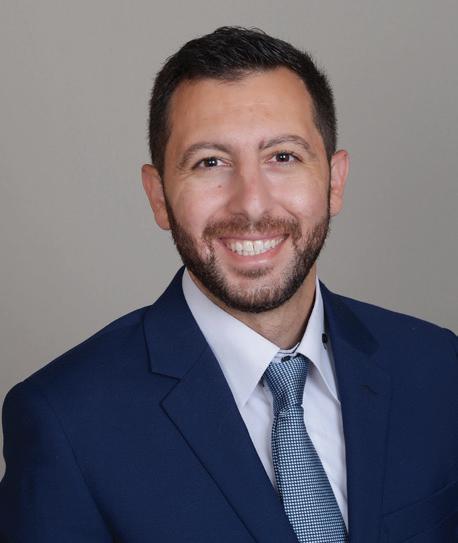
3 minute read
ASTRID ACOSTA
University of Arizona
Astridacosta@arizona.edu
Advertisement
Astrid Ignasia Acosta Bobadilla, is a junior at the University of Arizona majoring in Physiology and Medical Sciences and minoring in Biochemistry through the Franke Honors College. Astrid is originally from Lima, Peru and immigrated to the United States in 2020. Growing up she firsthandedly experienced the healthcare disparities in Peru, and this motivated her to pursue a career in the medical field. Astrid was inspired by her grandmother, Maria Teresa alias “Puquita”, who was from a small village in Andahuaylas, Peru. She taught her to always help those in need and to be an advocate for the defenseless. After graduating, Astrid wants to go to medical school and possibly specialize in surgery, OBGYN or family medicine. During her undergrad, Astrid has been able to travel and explore the US-Mexico border regions and she would like to practice medicine in rural areas to help people in unprivileged communities. Astrid aspires to also one day open various clinics in different villages in Peru to help people be treated for their illnesses as they do not have accessibility to proper healthcare in many of these rural areas. During her free time, she enjoys volunteering, watching movies, face-timing her family and friends in Peru, dancing to Spanish music, going to concerts and traveling.
Project Description
⊲ PROJECT
Sociodemographic Factors and Health Disparities Associated with the Prevalence of Extracranial Carotid Atherosclerotic Disease in the American Indian populations
Extracranial Carotid Atherosclerotic Disease (ECAD) results from plaque buildup in the common carotid artery and internal carotid artery, increasing the risk of ischemic strokes. ECAD affects 1.5% of the general population, aged 30 to 79, and accounts for 15% to 20% of all strokes. Since strokes can cause cognitive decline and are the leading cause of disability in the U.S, it is essential to protect vulnerable populations. In the U.S, American Indians have the highest prevalence of ECAD in comparison to other races, independent of age and sex. For this project, the team decided to approach this phenomenon with an emphasis on health disparities. These disparities are known to have affected American Indians in a great manner and is seen in their high rates of chronic conditions. This literature review aims to examine this phenomenon and ultimately bring awareness regarding ECAD in the American Indian population. The team hypothesized that the high prevalence of ECAD in the American Indian population is associated with high prevalence of cardiovascular risk factors, barriers of care, and lack of representation of American Indian populations in research.
Craig Weinkauf
MD, PhD
Associate Professor, Department of Surgery
Ccweinkauf@arizona.edu
Craig Weinkauf, is an Associate Professor with the Department of Surgery Division of Vascular and Endovascular Surgery at the University of Arizona College of Medicine - Tucson.
Dr. Weinkauf was born in Tucson, Ariz. and grew up in Washoe Valley, Nev. He completed his undergraduate degree at the University of San Diego and proceeded to earn his medical degree and doctorate at Tufts University in Boston, Mass. He returned to Tucson to complete his vascular surgery residency at the UA.

Dr. Weinkauf’s clinical practice focuses on caring for patients with vascular disease. This includes the broad set of conditions encompassing arterial, venous, or lymphatic pathologies.
Dr. Weinkauf’s research focuses on developing imaging strategies to help identify patients who may benefit from carotid artery interventions, whether that be to prevent strokes or cognitive dysfunction. His research draws from his background as an immunologist and his close collaboration with faculty from the Department of Medical Imaging.
Glory Adeyemo
University of Arizona, BSHS gadeyemo@arizona.edu is a graduating senior from the University of Arizona, holding a BSHS in Physiology & Medical Sciences. With a profound commitment to advancing healthcare and promoting health equity, Glory’s future is set on becoming a medical doctor specializing in OBGYN. With a deep sense of community, her ultimate goal is to give back, advocate for underserved and underrepresented populations, and address health disparities within her community. In her free time, Glory enjoys playing sports, collecting sneakers, and watching Nollywood movies.
⊲ PROJECT
Understanding the Risk of Adverse Birth Outcomes in Advanced Maternal Age
This study aims to investigate the potential maternal morbidities faced by women classified as having an advanced maternal age, which refers to pregnancies in women who are 35 years or older at the time of delivery. Maternal morbidities encompass a range of health issues experienced by mothers during pregnancy and childbirth, such as preeclampsia, postpartum hemorrhage, and other related complications. Through this research, the intent is to to shed light on the specific risks associated with advanced maternal age, and their implications for maternal and child health.





